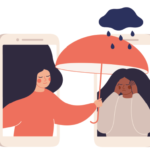You sit down at your partner’s desk at the end of a long day seeing patients in the office. You say aloud, “Things were going great until that last patient. She really took me out. She was mad at me for saying that the low-titer ANA [antinuclear antibodies] was not an issue and that she had only fibromyalgia. Go figure.”
How often have you spoken those words? Was this a difficult patient, or were you the cause of the problem? What is a difficult interaction for you, and what is the best way to deal with it?
The Problem
In the medical literature, the adjective “difficult” seems to be used often as a descriptor for a patient. Thus, we find synonyms for the difficult patient such as problem patients, angry patients, or even hateful patients. A search of the medical literature reveals nothing specifically written on this topic for rheumatology. In primary-care practices, the rate of encounters with difficult patients has been estimated to be between 15% and 30%.1 Not all of these patients have psychiatric problems, as you might initially think.
In his classic article, Grove describes hateful patients as one of the following: 1) clingers, 2) fearful patients, 3) help rejecters, or 4) self-destructive patients.2 Certainly, patients with these personality types can create a difficult interaction. I feel that although this was an early, valiant effort to address the issue, the language was too strong. Often these visits are uncomfortable rather than hateful. Difficult interactions may also center on drug problems, alcohol issues, or language barriers. Other times, the doctor’s own feeling or personality may be the issue. Did you notice the use of the phrase “only fibromyalgia” in the example above? Was the patient responding to your own unintended slight?
Perhaps we can best describe the source of the difficult encounter to be the patient, physician, other provider, or the illness, with the result being that either party feels the interview was unsuccessful. Whatever the frequency of such visits, it is clear that difficult patient interactions are common and can lead to significant dissatisfaction for both provider and patient, poor outcomes, low compliance, and even lawsuits.3,4
Tips for Better Encounters with a Difficult Patient
- What’s your trigger?
- Recognize a difficult encounter early.
- Discover the meaning of why the encounter is difficult.
- Enlist the patient to help you find a solution.
- Show empathy in your body language and words.
What Causes a Difficult Encounter?
The Institute for Healthcare Communication has been promoting workshops on the difficult patient for over a decade. The core teaching is that each provider should discover what constitutes a difficult patient for himself or herself. You may find yourself feeling upset by angry, manipulative, or somatasizing patients. Have you perhaps been sued by a patient similar to the one you are struggling with now? There may be a deep-rooted personal experience from your past. Your own prior experience can be at the core of the difficulty. Knowing your triggers will help you with the early recognition.



